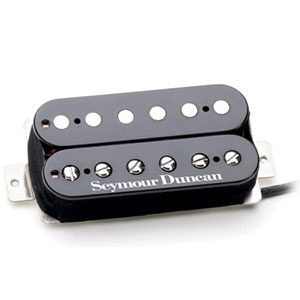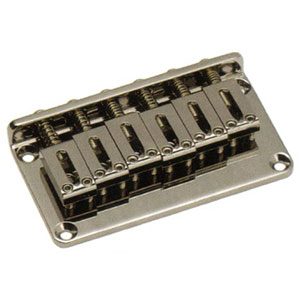- Home
- Instruments
- Gear
- Recording
- Lessons
- Reviews
- Blog
There are people out there that will claim you can play metal on any kind of guitar, as long as it’s electric and has pickups. While this isn’t necessarily false, case in point Dave Murray of Iron Maiden, it’s not that black and white. Modern guitar accessories and various guitar effects pedals can squeeze out a mean tone out of something like a Squire, which is absolutely true. But it doesn’t mean that Squire is the best guitar you can get for metal.
Today we’re going to talk about what makes a good metal guitar. There are several key elements that need to meet certain standards if you want the best tone possible. If you think you need to spend a fortune on a good guitar for metal, don’t worry. There are pretty decent affordable guitars that will get the job done just fine. With that sad, let’s jump straight to the matter at hand.
If you feel like diving into the meaty bit right away, check out our list of Best Metal Guitars on today's market.
If you look at modern metal guitars, you will find a pattern. First thing that is easily noticed is the presence of humbuckers. You will hardly find a metal guitar that doesn’t have at least one of these. The second thing is a thin neck followed by an agile bridge and hardware. Finally, we have the choice of tonewood. Let’s go over each of these and see how they ultimately affect the sound.
 Why humbuckers? The answer is rather simple. Single coil pickups have all the accuracy you could ever need, but they lack width. When you saturate the signal with high gain distortion, single coil pickups get quickly overwhelmed. All of that sonic accuracy is gone, and you are left with a very muddy tone that somewhat shallow despite all the gain. Humbuckers not only solve that issue but they also eliminate the pickup hum, which is the biggest flaw of single coils. Humbuckers generally come in tow versions. You have active and passive humbuckers. Passive humbuckers are generally found on less expensive guitars, and are more expressive.
Why humbuckers? The answer is rather simple. Single coil pickups have all the accuracy you could ever need, but they lack width. When you saturate the signal with high gain distortion, single coil pickups get quickly overwhelmed. All of that sonic accuracy is gone, and you are left with a very muddy tone that somewhat shallow despite all the gain. Humbuckers not only solve that issue but they also eliminate the pickup hum, which is the biggest flaw of single coils. Humbuckers generally come in tow versions. You have active and passive humbuckers. Passive humbuckers are generally found on less expensive guitars, and are more expressive.
Active humbuckers on the other hand have a lot stronger output but lack some of that clarity. There are some guitar players who will say that active pickups are always better than passive, however there are passive humbuckers out there which run laps around the most popular set of EMGs on the market right now. It’s all relative, and depends on the type of metal you play, and your playing style. What matters the most is to have at least one humbucker on your guitar.
Many people associate metal music with fast solo sections and a lot of shredding. As a matter of fact, this is a pretty decent way to describe metal in general. In order to make a guitar more suitable for fast solos, guitar manufacturers started slimming down the neck profiles on their models meant for metal. These days a thin neck is pretty much standard. Is it absolutely crucial to have a slim neck in order to play metal? No, not really, but it sure helps when you have a lot of hard solo sections to deal with.
 Bridge on a guitar built for metal is usually going to be a tremolo design of some kind. Floyd Rose is by far the most common solution on the market, while this company also licensed a wide variety of guitar manufacturers to build their own versions of this legendary bridge. Having a tremolo bridge is great as it gives you more flexibility, and allows you to dive bombs or crazy vibratos. A lot of big names in metal heavily rely on tremolo bridges for their music. If you don’t get a tremolo bridge, you are probably going to see a Tune-O-Matic bridge of some kind. This is becoming more and more true, especially these days. Standard fixed bridge is slowly becoming a minority in a market category it used to dominate.
Bridge on a guitar built for metal is usually going to be a tremolo design of some kind. Floyd Rose is by far the most common solution on the market, while this company also licensed a wide variety of guitar manufacturers to build their own versions of this legendary bridge. Having a tremolo bridge is great as it gives you more flexibility, and allows you to dive bombs or crazy vibratos. A lot of big names in metal heavily rely on tremolo bridges for their music. If you don’t get a tremolo bridge, you are probably going to see a Tune-O-Matic bridge of some kind. This is becoming more and more true, especially these days. Standard fixed bridge is slowly becoming a minority in a market category it used to dominate.
In terms of hardware such as tuners, you are usually going to see heavy duty versions. The reason for this is the fact that metal music takes a toll on the strings in more than one way. Having a set of locking tuners will help immensely with maintaining a tuning, and generally being able to accurately tune your guitar.

The choice of tonewood on metal guitars will vary depending on the price bracket that guitar is in. The best you can get for metal is probably going to be mahogany. It resonates well and has the depth necessary to push out even the most brutal riffs. The more affordable tonewood you will usually see is often going to be basswood. This is a soft wood which makes it somewhat fragile, but the tonal quality is there.
These four factors alone will define a great guitar for metal. However, you can go even deeper. Thankfully, finding a guitar that has all the qualities to be used in metal music is anything but difficult these days. There are many manufacturers out there who offer a whole range of great guitars that vary in price and performance, but most of which will be more than enough to get the job done.
If you would like to learn more about brands which make the best metal guitars at the moment, check out our article here ‘Who Makes The Best Guitars for Metal’. The last thing you should be worrying about when shopping for metal friendly guitars is aesthetics. Sure, if you like the way a guitar looks, you should have it. However, don’t make your decision solely based on the looks. Rather, use the appearance as a bonus.
If you liked this post, feel free to like, share, and comment – it's your feedback that fuels our passion for writing after all. Rock steady, folks!

Reader Interactions